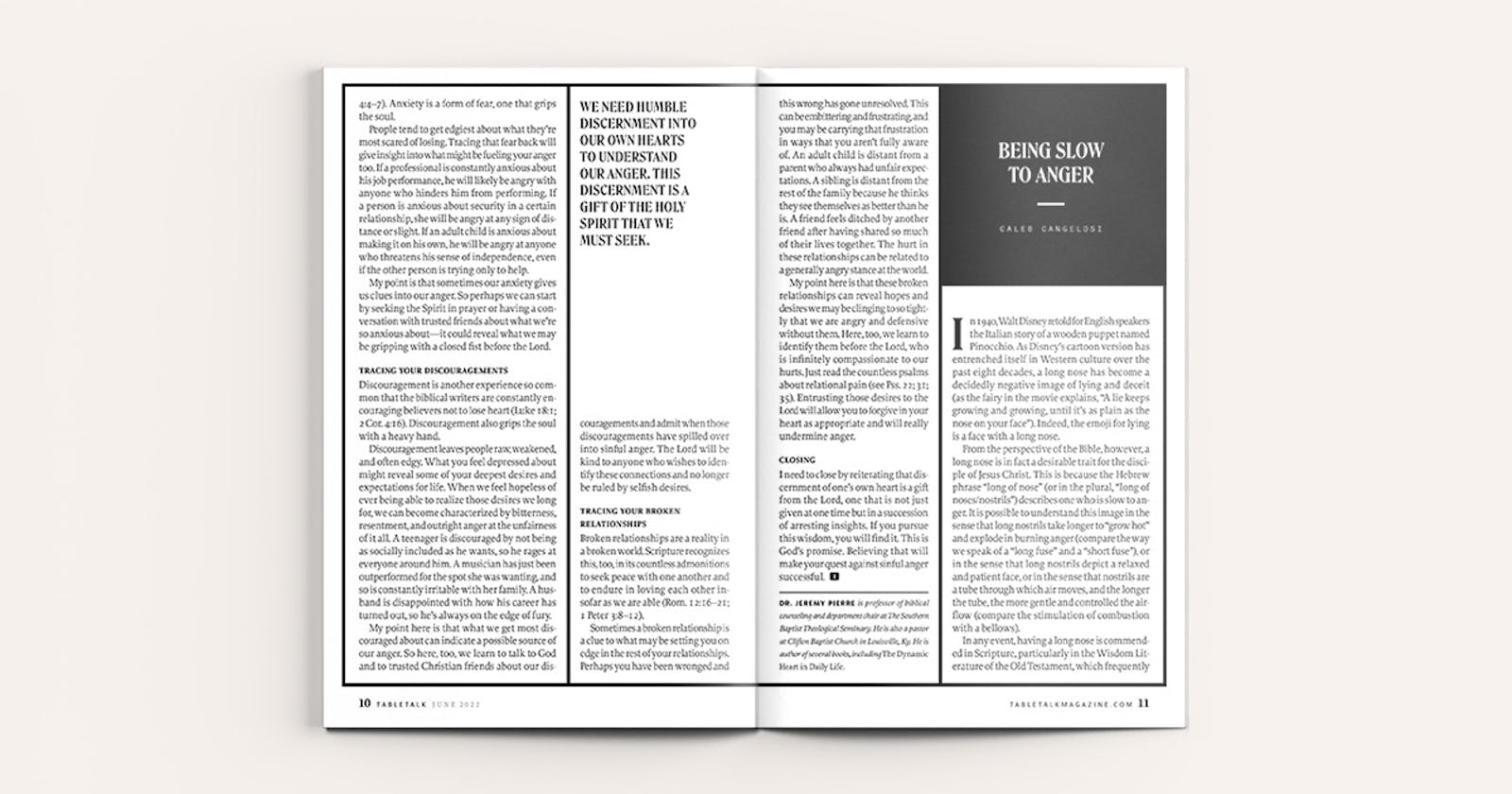
Request your free, three-month trial to Tabletalk magazine. You’ll receive the print issue monthly and gain immediate digital access to decades of archives. This trial is risk-free. No credit card required.
Try Tabletalk NowAlready receive Tabletalk magazine every month?
Verify your email address to gain unlimited access.
In 1940, Walt Disney retold for English speakers the Italian story of a wooden puppet named Pinocchio. As Disney’s cartoon version has entrenched itself in Western culture over the past eight decades, a long nose has become a decidedly negative image of lying and deceit (as the fairy in the movie explains, “A lie keeps growing and growing, until it’s as plain as the nose on your face”). Indeed, the emoji for lying is a face with a long nose.
From the perspective of the Bible, however, a long nose is in fact a desirable trait for the disciple of Jesus Christ. This is because the Hebrew phrase “long of nose” (or in the plural, “long of noses/nostrils”) describes one who is slow to anger. It is possible to understand this image in the sense that long nostrils take longer to “grow hot” and explode in burning anger (compare the way we speak of a “long fuse” and a “short fuse”), or in the sense that long nostrils depict a relaxed and patient face, or in the sense that nostrils are a tube through which air moves, and the longer the tube, the more gentle and controlled the airflow (compare the stimulation of combustion with a bellows).
In any event, having a long nose is commended in Scripture, particularly in the Wisdom Literature of the Old Testament, which frequently connects being slow to anger with wisdom and righteousness.
Two passages illustrate this connection: Proverbs 14:29 and Ecclesiastes 7:9. In the former, Solomon declares, “Whoever is slow to anger [long of nostrils] has great understanding, but he who has a hasty temper exalts folly.” The wise man knows that a hasty temper (literally, being “short of spirit”) is a celebration of foolishness, so when irritating circumstances arise, he seeks to keep his inner man in check—or, we might say, to keep his nostrils long. He “rules his spirit” (Prov. 16:32) rather than letting his spirit rule over him.
In Ecclesiastes 7:9, the Preacher writes, “Be not quick in your spirit to become angry, for anger lodges in the heart of fools.” Again, the person whose heart rapidly rushes to anger and is easily irritated, whether at slight or significant provocations, is the epitome of the fool. Anger finds no rest in the heart of the wise, for saints put a prickly temper out on the street as soon as it raises its ugly head.
God connects slowness to anger and wisdom for many reasons. Consider the following to stimulate your meditation. First, being quick to anger is associated with pride, which is the essence of folly (see Prov. 8:13; 11:2; 16:18; 29:23). In the verse just before Ecclesiastes 7:9, we read of this coupling: “Better is the end of a thing than its beginning, and the patient in spirit [literally, the “long of spirit”] is better than the proud in spirit” (Ecc. 7:8). We grow angry because we pridefully think that we know best how things should be. When we believe that some event or process is taking too long and are unwilling to wait for the Lord to bring it to its appointed end in His time, our arrogant impatience easily leads to anger.

Second, hasty anger leads to costly consequences. Even from a worldly perspective, a quick temper will quickly gain one a negative reputation, and it will cause a person to lose friendships, the respect of others, business opportunities, and inner peace. God in His Word reveals anger’s cost more deeply: “A hot-tempered man stirs up strife, but he who is slow to anger quiets contention” (Prov. 15:18); “A man of wrath stirs up strife, and one given to anger causes much transgression” (Prov. 29:22; see James 1:20). The wise man desires what leads to peace and righteousness, but anger instead brings about conflict and sin. James reminds us: “Where jealousy and selfish ambition exist, there will be disorder and every vile practice. But the wisdom from above is first pure, then peaceable, gentle” (James 3:16–17).
Finally, slowness to anger is a divine trait. That person is most wise who is most like God, and God is frequently described as being slow to anger (an anthropomorphic “long of nostrils”; see Ex. 34:6; Num. 14:18; Pss. 86:15; 103:8; 145:8; Joel 2:13; Nah. 1:3; etc.). To walk in wisdom is to reflect God’s character, most beautifully revealed in His Son, Jesus Christ, the wisdom of God. May the Spirit grant us every day more of the humble patience and wise slowness to anger of our Savior.
